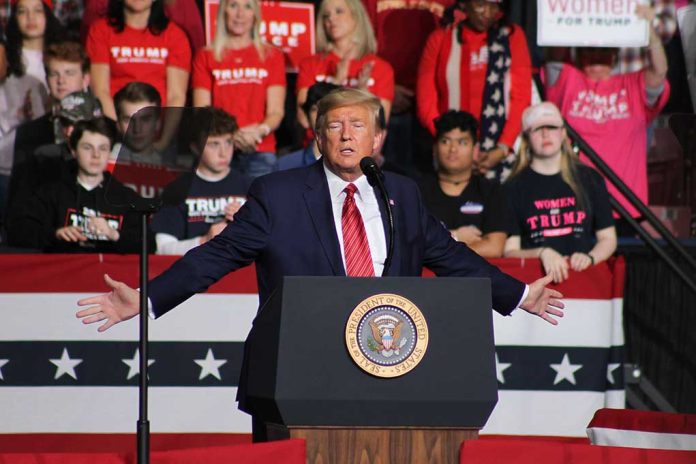
President-elect Donald Trump’s proposal for an “External Revenue Service” aims to shift the tax focus from domestic to international sources through tariffs on imports.
At a Glance
- Trump plans to establish an “External Revenue Service” to collect foreign tariffs and duties.
- The new agency will begin on January 20, 2025, at the start of Trump’s second term.
- Proposed tariffs include significant increases on imports from major trading partners.
- Economists warn that U.S. importers, not foreign suppliers, will bear the tax burden.
The New Tariff Focus
The proposal involves creating an “External Revenue Service” dedicated to collecting tariffs and other foreign-derived revenues. Scheduled to launch on January 20, 2025, the agency is seen as a pivot from traditional domestic tax reliance towards international financial sources. Critics argue that U.S. Customs and Border Protection already handle tariff collections. However, Trump repeatedly expressed discontent with current trade agreements, asserting America’s need to renegotiate such terms to ensure foreign entities contribute fairly.
In support of his stance, Trump suggested a strategic enhancement of tariffs, proposing a 10% increase on imports from China and 25% fees on Canadian and Mexican products. Economists caution these measures could lead to increased costs for American consumers. Additionally, retaliatory tariffs from other nations could compound economic challenges, further complicating the promised domestic tax relief.
Possible Economic Impacts
Experts like Erica York from the Tax Foundation suggest the concept of an “External Revenue Service” misleads as tariffs essentially tax American importers: “The president-elect may try marketing his higher tariff agenda as an external tax, but messaging does not change that higher tariffs will be paid by the people and businesses in the United States who import goods.” Inflation concerns loom large, potentially nullifying any benefits from Trump’s proposed tax cuts.
While Trump’s campaign views tariff revenue as a vital source to offset the cost of tax cuts and increased spending, skepticism arises regarding its feasibility. Economists warn about potential inflation and the adverse effects of broad-based tariffs imposed under the guise of national economic exigencies, foreseeing a possible erosion of intended economic benefits.
Legislative and Strategic Moves
Current federal law allows for tariff adjustments under national security pretenses or as measures against unfair trade practices. President-elect Trump deliberates declaring a national economic emergency to facilitate the imposition of these tariffs. This decision marks a continuation of Trump’s previous strategies aiming to leverage tariffs as a substantial fiscal tool supporting broader economic objectives.
“For far too long, we have relied on taxing our Great People using the Internal Revenue Service (IRS). Through soft and pathetically weak Trade agreements, the American Economy has delivered growth and prosperity to the World, while taxing ourselves. It is time for that to change.” – Trump
As the economic sector awaits further developments, the incoming administration’s approach continues to garner extensive discourse. Trump’s assertion on changing America’s taxation paradigm sets a distinctive tone for the anticipated economic reforms under his leadership.
Sources:
- Trump says he’ll create ‘External Revenue Service’ to collect tariffs, foreign revenue
- Trump says he’ll create “External Revenue Service” to collect tariffs
- Trump’s ‘External Revenue Service’ will collect from importers, not ‘foreign sources’




